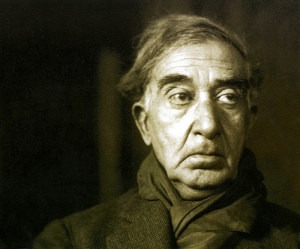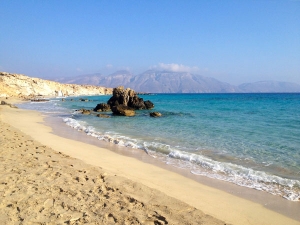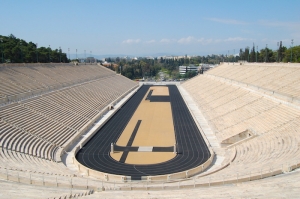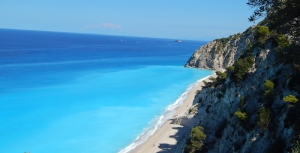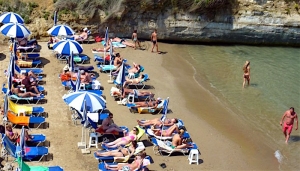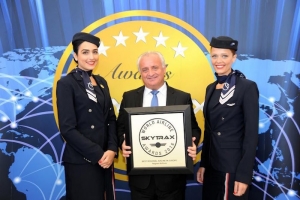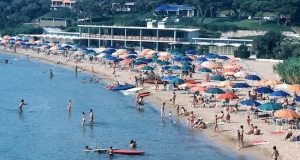SERVICES
XpatAthens
Monday, 15 August 2016 10:09
Trip To Greece By Melina Mallos
Trip to Greece is a colourful workbook with an interesting narrative in English, and Greek keywords to practise and learn. Each page offers multiple fun opportunities for your child to hear, speak, read and write Greek (activities vary on the child’s age and language ability).
As technology continues to connect the World, the skill of speaking a second language becomes more relevant and advantageous to our younger generations.
An Australian children’s’ educator and author has just created a unique tool for children in the Diaspora, bringing some fun and travel to the process of learning a second language.
Relocation to different countries for various reasons has also become very common, and these days, many people immigrate to countries with cultures and languages very different to where they were born and raised.
Children’s’ Multicultural Educator and Consultant, Melina Mallos, recognises the importance of promoting intercultural understanding among children, as well as promoting a firm connection with and appreciation of their own original cultural heritage.
Ms. Mallos, who was born and raised in Greece until the age of 6, is a high profile blogger and commentator on the subject of childhood intercultural understanding and appreciation for a number of years. She published her first bilingual children’s picture book in 2015, titled 'Catch that Cat!'
“We are fortunate to speak English here in Australia, a universal language, and therefore a lot of doors around the world automatically open for us. However, fluency in a second language will open up a whole new world of possibilities to your child. And there are reported health, social and intellectual benefits as well,” she said.
Ms. Mallos assures parents that there are multiple benefits for the child, aside from the obvious advantages of expansive life experiences, such as sharper brain functions, including listening, memory recall, better problem solving, improved critical thinking, greater cognitive flexibility, verbal and spatial abilities.
To purchase 'Trip To Greece,' please visit: Melina Mallos
About The Author
Ms. Mallos is a passionate writer, researcher and teacher with over 15 years’ experience working as a child educator in art museums in Australia. Ms. Mallos is also a frequent presenter at conferences, schools, libraries and community events. Her work has been featured in international journals, television and on the radio. In 2010, she was awarded a prestigious Queensland-Smithsonian Fellowship to research early learning programs in Washington D.C.
To purchase 'Trip To Greece,' please visit: Melina Mallos
About The Author
Ms. Mallos is a passionate writer, researcher and teacher with over 15 years’ experience working as a child educator in art museums in Australia. Ms. Mallos is also a frequent presenter at conferences, schools, libraries and community events. Her work has been featured in international journals, television and on the radio. In 2010, she was awarded a prestigious Queensland-Smithsonian Fellowship to research early learning programs in Washington D.C.
Published in
Books
Tagged under
Monday, 15 August 2016 07:00
Pickled Red Cabbage
Ingredients
- 1 red cabbage (sliced) – approximately 10 cups / 2 lb head
- 2 tablespoons salt
- 2 tbsp fennel seed
Brine Ingredients
- 4 cups white or apple cider vinegar
- 1 1/2 cup water and 1/2 cup white wine (OR) 2 cups water
- 3 tbsp date sugar OR 3 tbsps honey OR 1tbsp each brown/white sugar
- 2 cinnamon sticks
- 8 whole cloves
- 4 bay leaves
- 2 tbsp peppercorns
- 2 tbsp coriander
- 4 dried apricots (chopped)
Published in
Greek Food & Diet
Tagged under
Thursday, 11 August 2016 07:00
Greek Poet Konstantinos Cavafy's Journey To Brazil
How did the work of Greek poet Konstantinos Cavafy ever reached the distant, exotic and alluring land of Brazil? Who brought it there from this sun drenched tip of Eastern Europe called Greece, crossing the Mediterranean Sea and the Atlantic Ocean?
Cavafy’s poetry was introduced to Brazilian readers by the Portuguese modernist poet Jorge de Sena (1919-1978), who came to Brazil in 1959, when Portugal was under Salazar’s dictatorship, and, as part of the resistance, he found himself in the imminence of an arrestment. Later, when in 1964 Brazil went through its own military dictatorship, he went to the United States.
In the 80’s, Brazil entered an era of poetical translation, which included French poets like Mallarme, whose A throw of the dice never will abolish chance is his most influential poem, and Baudelaire’s collection of poems entitled Flowers of evil. The translation of English language poets, not only from Europe but also from the United States, has always been a tradition in Brazil; because of Cavafy’s popularity due to his introduction in Brazil by Jorge de Sena, Jose Paulo Paes (1926-1998) translated 75 of his poems directly from Greek.
Portuguese poets have taken as theme for their poetry the city, the time, and the great deeds of the past of Portugal, which is in some extend quite similar to Cavafy’s themes. Because they have such similarities and because Cavafy’s poetry is very present in modern Brazilian poetry, he became one of the favourite modern foreigner language poets to be explored by scholars and writers.
‘Ithaca’ is a known poem, but also ‘Waiting for the barbarians’ and the romantic ‘Body, remember’… All his poetry is now a very relevant part of literature in Brazil because, together with Portuguese poetry, it was an inspiration for Brazilian modern poets.
To read this article in full, please visit: Greek TV
Published in
Greek Language & Culture
Tagged under
Thursday, 11 August 2016 07:00
Greece In Need Of Teachers To Teach Refugee Children
Greece is currently on a hiring spree for hundreds of teachers to teach refugee children and to help educate the children who will be staying in Greece indefinitely, as other EU countries have closed their borders on the asylum seekers.
According to Save the Children NPO, the average amount of time that refugee children have been out of school is a year and a half. Even before that time period, many children were rarely able to attend classes on a regular basis due to the lack of safe places for education in their home countries. Refugee children would risk their lives to attend school in their home countries and because of the current conditions that migrants have received in the EU, children are still being left behind in the educational system. Some children as old as 10 have never learned how to write their name, let alone hold a pencil. In addition, more than a fifth of refugee children of school age have never stepped foot in a classroom.
In an effort to jump start refugee children’s education, Greece is looking to hire about 800 back-up teachers to meet the needs of the refugee community. Greece’s Prime Minister, Alexis Tsipras, said “The inclusion of all refugee children in the public school system will begin in September.”
Latest numbers of the refugee crisis hitting Greece puts the number of migrants trapped in Greece at around 57,000 with some one-third of that population being minors under the age of 18, a great majority of them, Syrians.
To read this article in full, please visit: Greek Reporter
Published in
Greece In The News
Tagged under
Tuesday, 09 August 2016 07:00
Best Uninhabited Island Destinations In Greece
Keros Island
Keros is located northwest of Amorgos. In ancient times, it was called Keria. It is a part of the Koufonissia islands and boasts and important archaeological sites as excavations have uncovered ruins from the Early Cycladic period 3200-2000 BC. The beaches are white sand and the waters turquoise. You may visit the island on your own boat or by hiring an excursion boat. Overnight stays are not permitted by the Archaeological Authority that watches over the island.
Lihadonisia
Lihadonisia is an island complex located across from Kamena Vourla in Evia. The islands are dotted with beaches created by volcanic inlets. Often referred to as the “Maldives” of Greece, the islands emerged as a result of a massive earthquake thousands of years ago and volcanic activity during the Cenozoic century. Thought to have been named after the servant of the God Hercules, Lihas, the islands can be reached via boat excursions operating from the harbor of Kavos in Evia.
Rhenia
If you are vacationing in Mykonos, why not take a one day yacht cruise to the uninhabited island of Rhenia? The island boasts unspoiled beaches and is only around a one hour trip by yacht from Mykonos. Rhenia was originally part of the sacred island of Delos. Today, Delos and Rhenia are separated by a very narrow sea strait and has much historical relevance and natural allure making this secluded island an ideal break from the crowded beaches of Mykonos!
To read this article in full, please visit: Greek Reporter
To read this article in full, please visit: Greek Reporter
Published in
Travel Greece
Tagged under
Tuesday, 09 August 2016 07:00
The History Of The Olympic Games
2,792 years ago the Olympic games were born!
We love this video by the World Economic Forum ~ it explains the history behind the incredible event that unites the world every four years.
We love this video by the World Economic Forum ~ it explains the history behind the incredible event that unites the world every four years.
Published in
Videos
Tagged under
Thursday, 04 August 2016 07:00
Greek Island Travel Interest Sparked By Plunging Airfares
A recent analysis of Kayak, the popular travel search engine, found that interest in flights to the Greek islands have increased by more than 300 percent from 2015. Crete was the most popular searched for destination with an increase of 345 percent. Corfu was popular as well with an increase of 238 percent in travel searches.
The islands were among Kayak’s Flight Index Top 50 for the most sought-after destinations. The interest was viewed as largely caused by the falling air fares, dropping by 62-67 percent in the past year.
With fares dropping compared to last year, the average price to the 50 most searched for destinations had dropped on average by 22 percent.
To read this article in full, please visit: Greek Reporter
To read this article in full, please visit: Greek Reporter
Published in
Greece In The News
Tagged under
Tuesday, 02 August 2016 10:33
An App-y Summer
The weather app on my phone tells me daily that Athens will hit 35 degrees or more – while my news apps tell me all about the best beaches and best seaside tavernas. My fitness app tells me I should keep jogging so I am fit for both. And my banking app suggests I should be cutting down on both.
What is life without our apps? They are the little magical assistants that help us do things that seemed simply impossible before. I am a particular fan of all the photo editing apps – and I certainly love the messaging apps like Whatsapp, Viber and so on…
But we are in the middle of Greek Summer, and this calls for some serious digital reinforcements. When the most pressing issue of many Sunday afternoons is ‘Where should we swim?’, which quickly turns into ‘Where will we find a spot on the beach?’ and the closely related ‘Where should we eat?’ – the gods of summer smile down on us and say ‘There’s an app for that…’
Let’s start with getting a spot on the beach… While there is no shortage of beaches to choose from, there is quite often a shortage of beach loungers, beach beds, umbrellas and ‘ksaplostres’. There are 2 slick new apps that promise to rid you of your mid-summer beach lounger stress.
Summerize and Plazz are brand new apps that let you select a beach, view related pricing, select a date, select a particular spot on the beach, and reserve your beach lounger in advance. This is for beaches around Athens, and in fact around the entire country. You can book water sports, too. So simple, and so great. Everyone I’ve told about this so far has had an identical response: ‘I have been saying that forever!’ So clearly this is an app that was long overdue. In both offerings, the interface is totally simple, the details are easy to understand, and the whole process is very smooth – kudos to both! The only drawback is that there aren’t yet a huge number of beaches that are available for booking via the apps. I assume this is because they are both start-ups, and will grow their service base over time. I already used Summerize to book a spot at Akanthus Beach the other day – it worked with no issues at all.
So now you’ve found your beach and reserved your spots. But before you order those fries and toast for lunch (and hit snooze on the fitness app), it could be a good time to think about dinner. But from your sunny perch beside the Mediterranean, who has the mental capacity to make such decision, much less call to book a table?
Enter ‘e-Table,’ a cool new app for selecting, reserving and commenting on more than 1800 restaurants in Athens and around Greece. From tavernas to sushi to Mexican to brunch – they’ve got them all. This award-winning app is the only one in Greece that allows you to make instantly confirmed reservations at popular restaurants directly from your phone. Great interface, easy navigation, tons of choice – and it actually works.
And like many of the smartest apps out there, these solve a problem that I never even knew was a problem, to the point where I can’t imagine what life was like before. So here’s to a fun and app-y summer!
Maybe I’ll turn off notifications on that fitness app...
Until next week,
Jack
Published in
My Week In Athens
Tagged under
Tuesday, 02 August 2016 07:00
Aegean Wins Best Regional Airline In Europe Award
For the sixth year in a row, Aegean Airlines has taken home the ‘Best Regional Airline in Europe’ award from the 2016 Skytrax World Airline Awards. The Skytrax World Airline Awards are highly regarded as the passengers choice, as they collect passenger satisfaction surveys from over 280 airlines and 104 different nationalities.
This year’s awards took into account the customer surveys that were conducted over a period of August 2015 until May 2016, which measured the quality standards across 41 performance indicators of quality product and service.
The CEO of Skytrax, Edward Plaisted, said that “Aegean remains a favorite amongst passengers in Southern Europe and continues to perform well in the awards surveys on both regional and a global basis.”
“All of us at AEGEAN are delighted to receive this important award for the 6th year in a row. This award motivates us to do more for our customers’ needs. We remain focused on the enhancement of our services and we are proud that our effort has been recognized by the passengers”, Dimitris Gerogiannis, CEO of AEGEAN, said.
To read this article in full, please visit: Greek Travel Pages
To read this article in full, please visit: Greek Travel Pages
Published in
Greece In The News
Tagged under
Monday, 01 August 2016 07:00
Unsafe Water Pollution Levels Found At 4 Attica Beaches
In recent news, swimmers have been urged to be cautious this summer when choosing a beach for a swim due to highly polluted waters found at 4 of the Attica region beaches.
According to a report conducted by the Greek National Center for Ecological Research (PAKOE), 4 of the 17 popular beaches in Attica were found to have water with high pollution levels and were listed as ‘unfit for swimmers due to unsafe bacteria levels in accordance with the EU stipulations.’
Blacklisted Beaches
Kavouri
Megalo Kavouri
Aghios Nikolaos in Lagonisi
Published in
Local News
Tagged under



